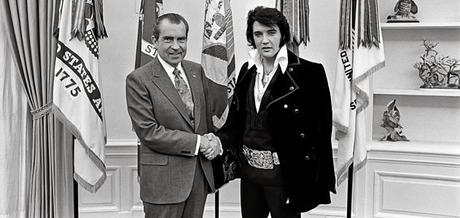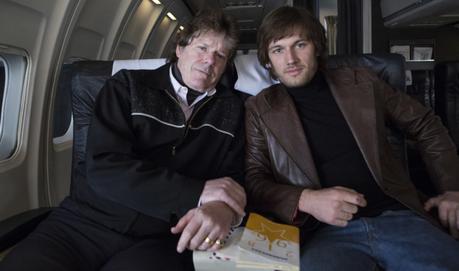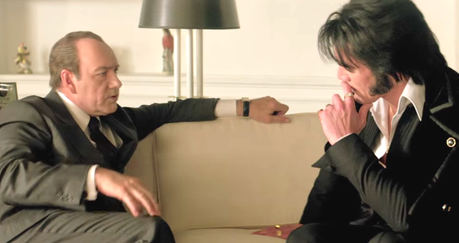On December 21, 1971, Elvis Presley and Richard Nixon posed together for a picture in the Oval Office, and the resulting photograph became the most requested of all the ones housed in the National Archives. Within six years of posing for the photo, Nixon would be impeached and Elvis would be dead. However, for that one day their seemingly disparate worlds collided, leading the world to forever wonder, “Why in the world was Elvis at the White House? What could they have even talked about? Why does it look so much like they’re actually enjoying each other’s company?”

The film starts in Graceland, where Michael Shannon’s vaguely recognizable version of Elvis (Shannon was clearly cast for his acting ability, not his physical resemblance to the man) is watching three TVs simultaneously, growing increasingly frustrated with the footage of war protests, drug usage and general social unrest. Seemingly on a whim, he decides to do something about it, hopping a flight to Los Angeles to recruit his old friend Jerry Schilling (Alex Pettyfer) into being his traveling companion to the White House. There is a vague hint of some kind of falling out in their past, but an unmistakable level of lingering devotion, enough that Schilling drops everything he’s doing to essentially function as Elvis’ traveling assistant/press secretary.

The real Jerry Schilling (left) and Alex Pettyfer, the guy who plays him (right), on the set of ELVIS & NIXON, an Amazon Studios / Bleecker Street release.
With the absolute ease of someone who’s done this countless times before, Jerry calls ahead to secure hotel reservations, and he also calls Graceland to smooth things over with Priscilla and The Colonel, neither of whom knew where Elvis was. Once in Washington, Jerry acts as the go-between with the White House, but when he calls home to check in with his girlfriend he’s reminded that they had a dinner party planned where he was supposed to meet her parents for the first time. He was actually going to ask for her father’s permission to marry her.
And, boom, suddenly the film has a ticking clock plot mechanism. If they don’t manage to meet with Nixon by a certain time Jerry will fly back home to be there for his girlfriend and future wife. Eventually Elvis and Jerry are joined by a third party in D.C., bodyguard Sonny West (Johnny Knoxville…yes, that Johnny Knoxville), but he appears to be more of a hanger-on type content to feed off of Elvis’ fame as opposed to being a genuine friend. He proves instantly incapable of keeping tabs on Elvis, indicating that if Jerry does end up leaving Sonny will be an inadequate replacement and any meeting with Nixon will certainly never happen.
Really, the movie is called Elvis & Nixon, but it should be called Elvis & Jerry’s Excellent Adventure. Nixon is ultimately a minor player in the whole affair, and Elvis’ impulse to see him turns out to have been the momentary whim of a rock star who was less committed to social justice and more to collecting trophies. It is through his strained friendship with Jerry that we understand just how much Elvis had begun to drown in his own public persona by that point, leaving him increasingly desperate to find ways to improve his own self-worth. We are meant to equate his seemingly random quest for a badge from the federal government with his continued efforts to buy Jerry’s friendship. It’s all the work of a man who wants to feel like he matters as a person and not simply as an icon, and Shannon plays him as a remarkably pitiable figure, one whose private moments did not at all match up to his public persona.
But the problem with this is that at the end of the day the movie is still called Elvis & Nixon. That’s the main event you signed up to see, and Elvis’ quasi-conflict with Jerry is the dramatic undercard you didn’t know was coming. It provides insight into Elvis’ state-of-mind, but it also treads rather familiar territory, i.e., the trials and tribulations of the extreme rich and famous. Do you care that Elvis struggled to tell who his real friends were, and no longer knew how to behave like a real person? Or do you just really want to see him finally meet Nixon? The former might be necessary to help us better understand why the former even happened, but it ultimately gets in the way of what you want to see.

Similar to Michael Shannon, Kevin Spacey was clearly not cast to play Nixon based on physical resemblance, but he does a far, far better job than Shannon of capturing the essence of the famous person he’s playing
Of course, there are various plot complications further preventing the inevitable meeting, eventually turning Nixon aides Bud Kogh (Colin Hanks) and Dwight Chapin (Evan Peters) into Jerry and Sonny’s co-conspirators in making this thing finally happen. Johnson’s directing and the script plays this with an extremely light touch while playfully dropping little hints that Kogh and Chapin will eventually get into a world of trouble for this type of conspiracy activity since they did both serve jail time for their part in Watergate.
By the the time the film reaches its title card moment, it feels like the whole wait might have been worth it. Once Elvis and Nixon are in the room together, you never want to leave, particularly because in the hands of Kevin Spacey Nixon’s continued befuddlement over what the hell is happening in front of him is an absolute delight. Frustratingly, though, the film continually cuts away to Krogh and Jerry outside the Oval office, meaning there are chunks of the Nixon-Elvis conversation which go unheard.
Part of this might be based in historical fact. Nixon wasn’t yet recording all of his oval office conversations in 1971, and except for those moments when Krogh was present there was no one else in the room to overhear the conversation. So most of it has to be made up and filled in with the bits Krogh previously told The Smithsonian in 2010.
For the time we are in the Office with them, Shannon and Spacey wisely play it straight, realizing the inherent absurdity of the material is instantly amusing. These two people somehow find common ground and form an improbably bond. While promoting the movie on The Late Show with Stephen Colbert, Kevin Spacey claimed Nixon & Elvis grew so close that for the rest of their lives they kept in touch and would call each other whenever the other one was in a hospital. However, none of that made it into the movie. The closest we get is when Elvis finally departs the Oval office Nixon excitedly proclaims, “Good. I liked him,” before laughing to himself a little over what just happened. He then pauses for a beat before getting on with his day, instructing his secretary to get Henry Kissinger on the phone.
Thus, Nixon’s final cinematic moment is spent showing just how quickly he had to move on with his day, turning his meeting with Elvis into an ultimately pointless “a funny thing happened today at the office” moment. Try as it might, that is ultimately what Elvis & Nixon feels like, an amusing, but weightless depiction of that one time Elvis met Nixon one crazy morning back in December 1971.
Amazon Studios picked Elvis & Nixon up from the film festival circuit last year. After it ends its current theatrical run, it will go straight to Amazon Prime, and that feels like the perfect home. As a film you pay to see, Elvis & Nixon might underwhelm, but as something you stream on a lazy Sunday afternoon it will be a perfectly pleasant diversion.
ROTTENTOMATOES CONSENSUS
76% – “Elvis & Nixon may not do much to expand on its absurdly iconic photographic source material, but it’s rarely less than engaging thanks to its talented starring duo.”
A PARTING FACTOID
Here’s a good “Did You Know?”: Elvis & Nixon claims Elvis legitimately wanted his badge from Nixon so that he might help in the fight against drugs. However, in her autobiography Priscilla Presley claims Elvis really wanted the badge because he believed it would allow him to legally enter any country with any guns or drugs he pleased. Thus, he didn’t want a badge from the Bureau of Narcotics and Dangerous Drug to help in the fight on drugs but instead to further enable his own drug habit.

